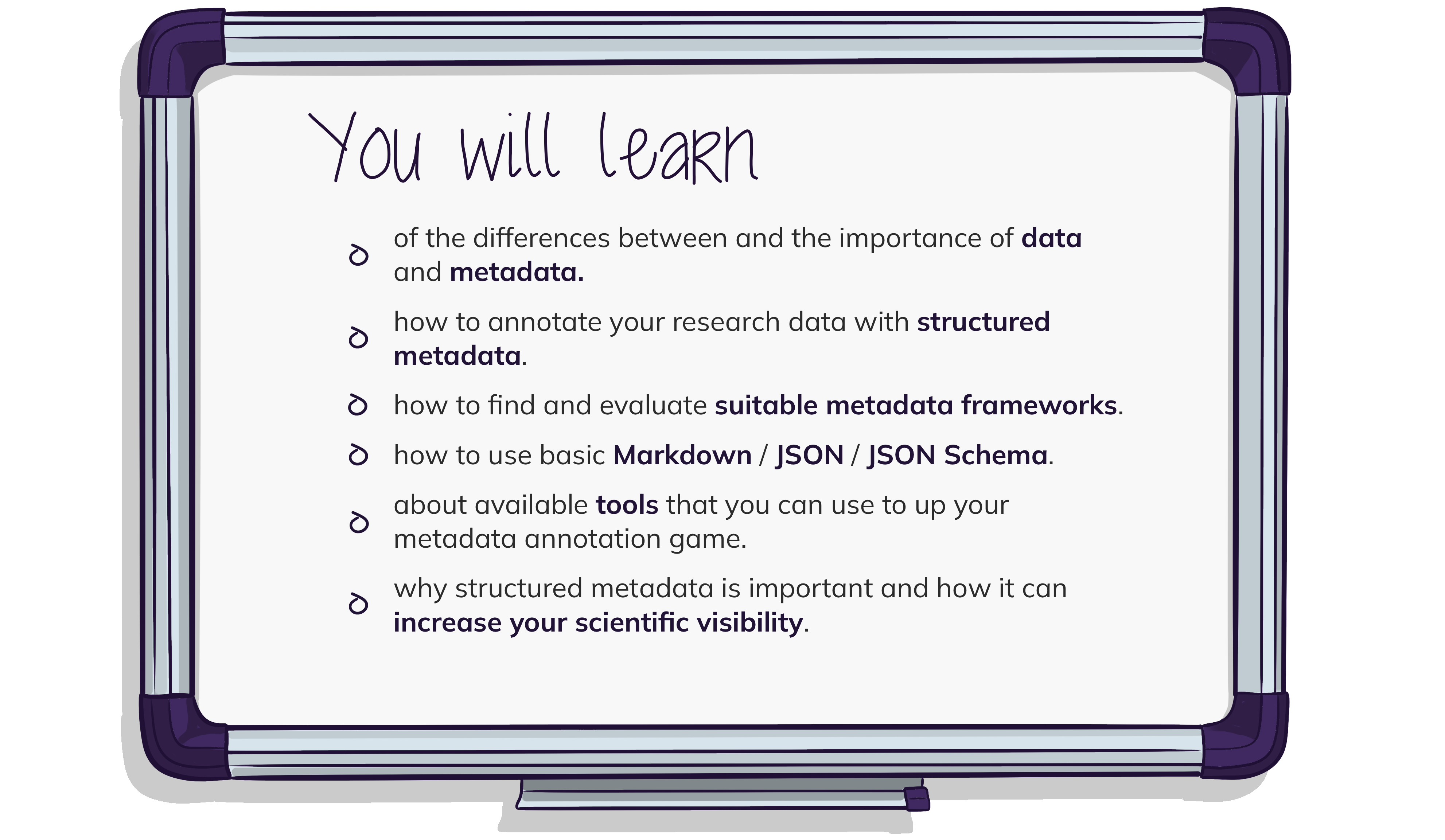Summary and Schedule

to our entry-level introduction to the fundamentals of scientific metadata!
In this lesson we will look at the intricate relationship between (digital) research data, metadata and knowledge, discuss why metadata is critical in today’s research, as well as explain some of the technologies and concepts related to structured machine-readable metadata.
Have you ever struggled to make sense of scientific data provided by a collaborator - or even understanding your own data 5 months after publication? Do you see difficulties in meeting the data description requirements of your funding agency? Do you want your data to have lasting value, but don’t know how to ensure that?
Precise and structured description of research data is key for scientific exchange and progress - and also for the recognition of your effort in data collection. The solution: make your data findable, accessible, interoperable and reusable by describing them with metadata.
This course is targeted at scientific staff and researchers from all
fields who are interested in annotating their research data with
well-structured and useful metadata.

This lesson is for you, if…
- … you are completely new to the topic of scientific metadata.
- … you are looking for alternatives for documenting your research data.
- … you have a basic understanding of metadata but want to gain some hands-on experience.
- … you want to get into the function and syntax of JSON and JSON schema.
- … you are looking for metadata standards and tools.
This lesson may not be what you are looking for if…
- … you know the difference between a metadata schema and a standard.
- … you annotate your research data with structured metadata (XML, JSON, YAML).
- … you have in-depth knowledge on web technologies and data exchange formats.
- … you are struggling with a specific metadata problem and just look for this one solution.
- … your main interest lies in linked data and semantic web technologies
We prepared some General Lesson Information for you as a starting point 😉
This training course was created by the Hub Information of the Helmholtz Metadata Collaboration (HMC) at Forschungszentrum Jülich, an incubator-platform of the Helmholtz Association within the framework of the Information and Data Science strategic initiative


| Setup Instructions | Download files required for the lesson | |
| Duration: 00h 00m | 1. Getting Started |
What makes us understand the context of data? How do you approach an unknown dataset? |
| Duration: 00h 12m | 2. Data and Metadata |
What is data and what is metadata? Which types of metadata exist? Where can I find (meta)data in everyday examples? What are bad and good enough practices of metadata handling in the scientific context? ::: |
| Duration: 01h 27m | 3. Structured Metadata: From Markup to JSON |
What is semi-structured metadata? How do you extract semi-structured metadata from natural language. What is the JSON syntax? |
| Duration: 03h 07m | 4. Enabling Technologies and Standards |
What are the benefits of creating or using standards and metadata
schemas? How do you find a suitable metadata standard or terminology for your research field online? |
| Duration: 05h 07m | 5. (Web) Location and Identifiers |
What are PIDs? What are the differences between URL, URI and PID? Which PIDs are connected to the research context? How are PIDs used in metadata records? |
| Duration: 06h 07m | Finish |
The actual schedule may vary slightly depending on the topics and exercises chosen by the instructor.
Setup
This lesson does not require any special setup.
All you need is a Web browser and a text editor and you are good to go.
Additional material will be provided throughout the challenges.
